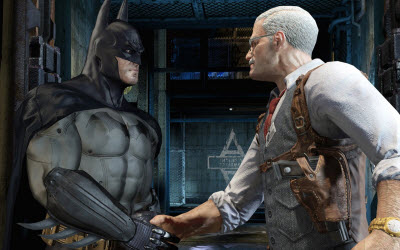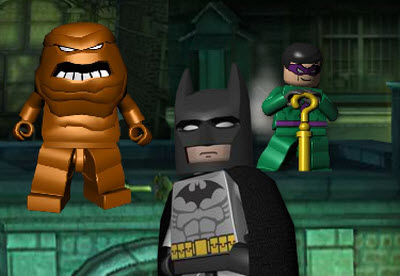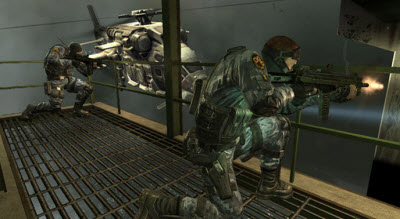 VentureBeat recently interviewed Martin Tremblay, the head of video games at Warner Bros. Interactive Entertainment. In years past, he would have been an unlikely conversation partner for us, as Hollywood movie studios often failed at making their own games and had to rely on video game publishers such as Electronic Arts to make decent titles off of their movie releases. But Warner Bros. saw the value and profits of the video-game business and dove headlong into it five years ago, bringing much of its game business in-house. Warner invested acquired several studios and made an investment in OnLive, a digital game distribution business. The payoff includes hit games such as last year’s critically acclaimed hit Batman Arkham Asylum. Tremblay recently hired a new digital games chief and his newly acquired Turbine division just announced that Lord of the Rings Online will become free-to-play this fall. All of a sudden, this movie-game hybrid company is looking like a game maverick. Here’s our talk with Tremblay about Warner’s big bet on games.
VentureBeat recently interviewed Martin Tremblay, the head of video games at Warner Bros. Interactive Entertainment. In years past, he would have been an unlikely conversation partner for us, as Hollywood movie studios often failed at making their own games and had to rely on video game publishers such as Electronic Arts to make decent titles off of their movie releases. But Warner Bros. saw the value and profits of the video-game business and dove headlong into it five years ago, bringing much of its game business in-house. Warner invested acquired several studios and made an investment in OnLive, a digital game distribution business. The payoff includes hit games such as last year’s critically acclaimed hit Batman Arkham Asylum. Tremblay recently hired a new digital games chief and his newly acquired Turbine division just announced that Lord of the Rings Online will become free-to-play this fall. All of a sudden, this movie-game hybrid company is looking like a game maverick. Here’s our talk with Tremblay about Warner’s big bet on games.
VB: Tell me how far Warner Bros. has come in video game business.
 MT: We acquired Monolith Productions in 2005. That was the first time we moved into the game business. We bought it for The Matrix Online massively multiplayer online game. It was an early move into those games. That game didn’t work out well. But that was the first step into the video game game business. Following that, the second big move was the acquisition of TT Games in 2008. It was a big step for us to be involved in casual and family games. It was a proven developer of the LEGO games. And so far we are very proud of that acquisition. It worked out very well. Following that, we made a long-term commitment with LEGO to build games for them through 2016.
MT: We acquired Monolith Productions in 2005. That was the first time we moved into the game business. We bought it for The Matrix Online massively multiplayer online game. It was an early move into those games. That game didn’t work out well. But that was the first step into the video game game business. Following that, the second big move was the acquisition of TT Games in 2008. It was a big step for us to be involved in casual and family games. It was a proven developer of the LEGO games. And so far we are very proud of that acquisition. It worked out very well. Following that, we made a long-term commitment with LEGO to build games for them through 2016.
Next, we acquired Snowblind Studios, one of the best role-playing games. They introduced some of the first successful RPGs on the consoles. We thought that Snowblind and Lord of the Rings, our entertainment property, were well matched. That was a perfect fit to take care of our precious intellectual property in games. We have also acquired assets of Midway, including the Mortal Kombat rights and the studio  that created it in Chicago. They are one of the best teams in the world at making fighting games. (Today, Warner Bros. announced it will launch a new version of Mortal Kombat for the PS 3 and Xbox 360 in 2011). We then acquired Rocksteady Studios, taking a 75 percent stake in that company to make quality Batman games for the future. And the last acquisition we made was of Turbine, the maker of Dungeons & Dragons Online and Lord of the Rings Online.
that created it in Chicago. They are one of the best teams in the world at making fighting games. (Today, Warner Bros. announced it will launch a new version of Mortal Kombat for the PS 3 and Xbox 360 in 2011). We then acquired Rocksteady Studios, taking a 75 percent stake in that company to make quality Batman games for the future. And the last acquisition we made was of Turbine, the maker of Dungeons & Dragons Online and Lord of the Rings Online.
VB: Turbine has done well with its conversion of D&D Online to free-to-play?
MT: Yes. The game was not successful prior to its conversion to free-to-play. But now it has more than 200,000 users that play the game regularly. Based on NPD market share numbers, that game is the No. 3 massively multiplayer online game in North America. It proved the free-to-play model is the the model of the future.
VB: You announced that Jeff Junge will run your digital games business. What are your plans for that?
MT: We are looking at it from multiple angles. We have Turbine, which has a digital platform in its massively multiplayer online games. We intend to use it as our standard online platform. Right now, about 7 percent of our revenue comes from digital online games. We expect that by 2013 it will be 20 percent of our revenue. Our strategy is to make sure that every single game we have will have a digital online component. Turbine has a terrific community management infrastructure. They are mastering how to interact with consumers, insert statistics into the game, and communicate with our gamers. We see that community management as a big asset. We also see digital online games as e-commerce platforms for the future. At the moment, most of our digital business is at Turbine. But in a year, our entire portfolio will have some kind of digital platform.
 VB: Digital means a lot of different things. When you look at what you want to focus on, how do you define digital games?
VB: Digital means a lot of different things. When you look at what you want to focus on, how do you define digital games?
MT: It’s a good question. We are already involved in digital downloadable content, or DLC, on the connected game consoles. We have done well with that. We have the free-to-play model with D&D Online. We could call some of these games light persistent MMOs, where they are smaller games that fit well with the intellectual property we own. We are looking at iPhone, iPad and mobile games in general. Those are the initiatives we are looking at. We are looking at browser-based PC games. We don’t know what we will do there. We have good intellectual property that will work good in those kinds of games. We are looking at every single piece of the online game business.
VB: What do you think of Facebook games? Are they on your radar?
MT: Yes. I didn’t mention it but we are looking at investments in social network games. Nothing has been announced yet.
VB: That business has gotten a lot of attention, especially after EA bought Playfish for $300 million plus and Zynga raised $180 million. What do you think of all of that attention that space is getting?
MT: As soon as you have a digital publishing platform, it is difficult for us to justify a huge investment. We believe that the social network space has a very low barrier to entry. That means it is easy to move into that space. It is an option for us, and if we do it, we will do it by ourselves with our own studios.
VB: If you look at the major game publishers, Activision Blizzard has a huge hit with World of Warcraft. EA is trying a lot of things in digital. They seem to be serious about it. How do you compare your own strategy to the other guys?
MT: It’s had to talk about the other guys. Our intention here is to make sure that digital today is a combination strategy. We have to invest in digital online games, but also in retail games. You can’t survive in the market now with online digital games. We have to please both sides of the business. We believe that by adding strong community tools and a strong e-commerce strategy, we can be very competitive in the future. Over the last two years, we have been profitable as an organization at Warner Bros. Interactive Entertainment. We believe we can stay profitable.
VB: How many people do you have across the different studios?
MT: Internally, we have more than 1,500 people. We use our Warner Home Video distribution business to distribute our games at retail. That is a huge organization. That gives us a unique offer for retailers. We can give them games, movies and consumer products as well as a digital online solution. No one can match us.
 VB: You have some synergies with the home video division?
VB: You have some synergies with the home video division?
MT: Yes. We are a company that is building intellectual property. That can be movies or games. We want to build IP like Lord of the Rings or Batman in the right way. We want to be coordinated and don’t want to look like three or so companies.
VB: Indulge me in how I ask this question. Why was it important to bring all of the Lord of the Rings game properties together in the darkness and bind them?
MT: Ha. Do you mean bring them all under the Warner Bros. umbrella?
VB: Yes.
MT: Lord of the Rings is a very complicated intellectual property. There are so many different stakeholders for it. We wanted to make sure we own it all and that the quality of the movies and the games will under our control. To do that, we want to make sure we don’t confuse the customer with Lord of the Rings products. The console game will not compete with the online game. We want them to be complimentary.
 VB: A lot of people would have said that the Peter Jackson movies would have been the peak for that franchise. It’s clear from your bets that you don’t think that’s true.
VB: A lot of people would have said that the Peter Jackson movies would have been the peak for that franchise. It’s clear from your bets that you don’t think that’s true.
MT: You are right. If you look at the online side, with the amazing success of Lord of the Rings Online, there are lots of subscribers. We believe we can do even better than that. It’s a huge world that we can work on. There is so much there. I can’t talk about everything there. We see the franchise as having lots of potential in the future.
VB: Do you believe the core console business will shrink and the digital business will grow and offset that?
MT: It’s a difficult question. If you look at all of it, you see the market will still grow. That’s why we believe both businesses are key to the future. Digital is not going to grow so fast that you don’t need retail. You need a strategy that embraces both now.
VB: How do you look at the different game platforms now? Will you embrace them all equally?
MT: We are one of the few publishers that are embracing all platforms. We have games for families with LEGO and games for teens with Lord of the Rings and Batman. We have major games coming like Lord of the Rings War in the North. We believe that the PC is here to stay. That PC business includes casual MMOs, browser-based games, and hardcore MMOs. We are on iPhone and mobile. We are everywhere. We want our key franchises to be well exploited on all platforms.
 VB: What are you looking forward to at E3?
VB: What are you looking forward to at E3?
MT: We have LEGO Harry Potter. We believe it is our best LEGO game so far. We are very excited about Fear 3. We are proud about Lord of the Rings War in the North. There is another one I can’t talk about. This is going to be our biggest E3. We are excited about motion controls. We have integrated Sony’s Move controller into our Lord of the Rings Aragorn’s Quest game. We have something on Natal. We are coming up with new innovations.
VB: You still have EA handling your Harry Potter movie games. How do you feel about that?
MT: We have LEGO Harry Potter coming. But we also have our own rights with Harry Potter. EA still has rights for the movies. That is the way it is for the moment. We are still thinking about the future.
VB: What do you like about Sony Move and Microsoft’s Project Natal?
MT: The market needs it. Casual games will benefit. It will create a big buzz at E3 and bring a lot of energy into the market. We are building on both platforms and this will be the most exciting thing we will see at E3 this year.
VB: I’ve noticed there are a lot of MMOs for young people, like the Marvel Super Hero Squad and Star Wars Clone Wars Adventures. Is that a trend? Do you see the point of making such online games for young people?
MT: Yes. Absolutely. We are looking at that space. We have not announced something yet. We believe the casual MMOs which we call live, persistent worlds are very interesting.
VentureBeat's mission is to be a digital town square for technical decision-makers to gain knowledge about transformative enterprise technology and transact. Learn More
